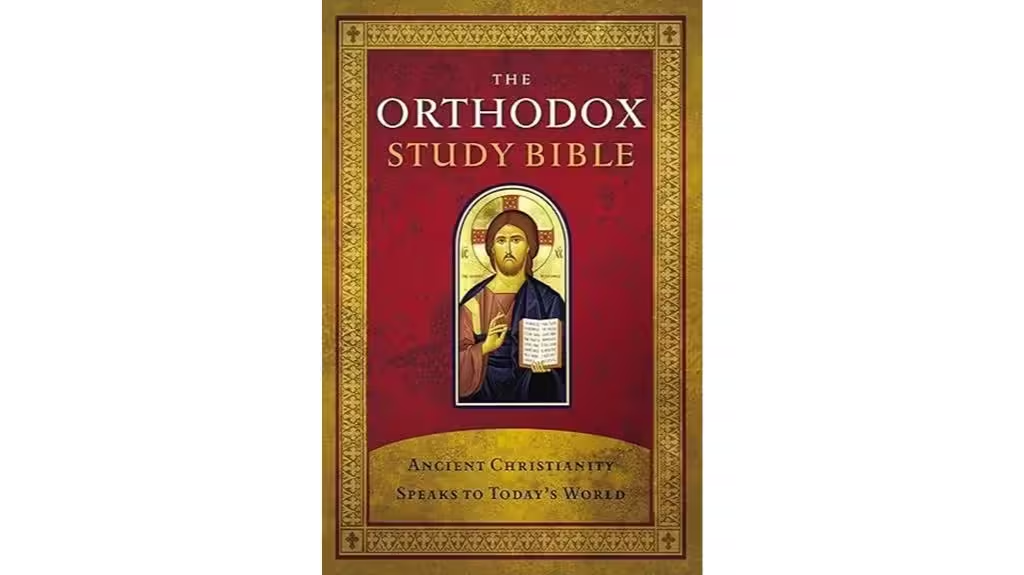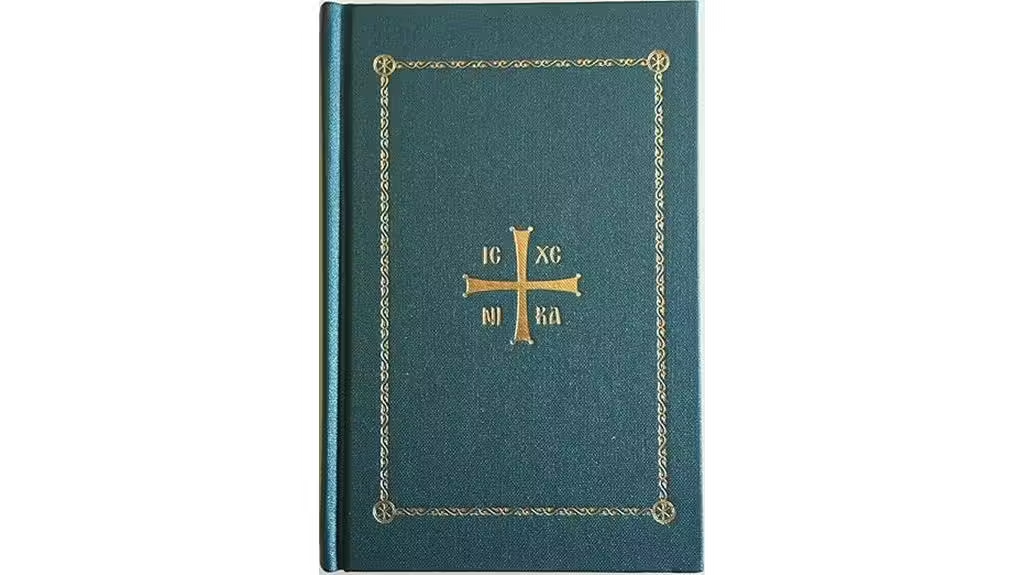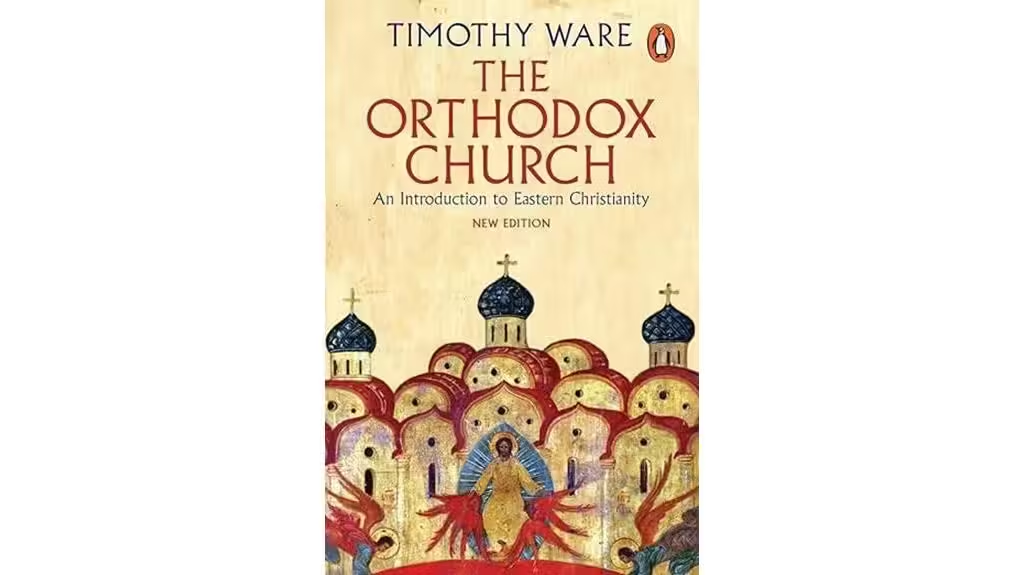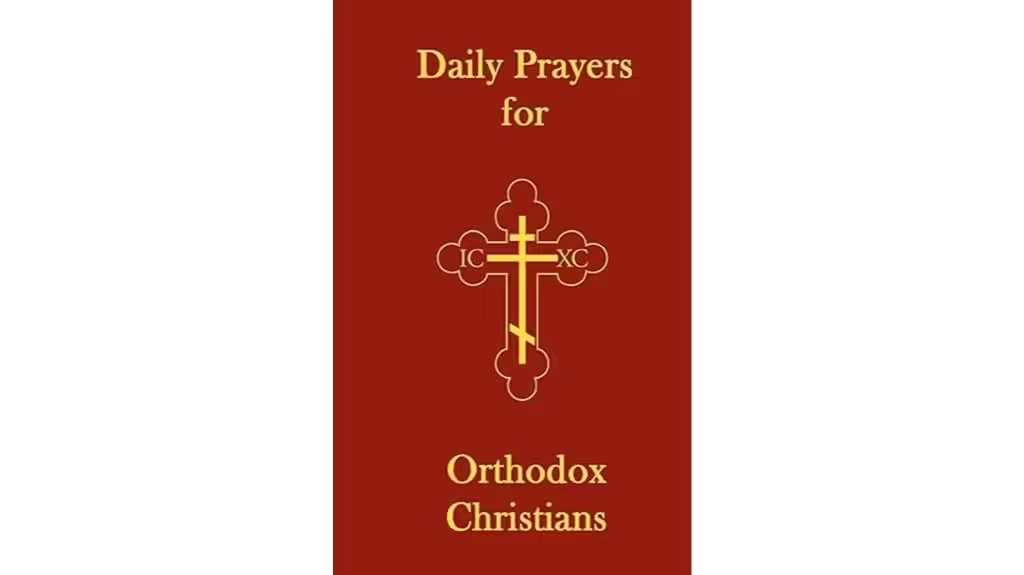To deepen your faith and understanding of Orthodox Christianity, consider these five essential books. Start with the Orthodox Study Bible for its rich commentary and Septuagint texts. The Orthodox Christian Prayer Book offers a wealth of prayers for daily use. Explore The Orthodox Church by Fr. Timothy Ware for insights into history and worship practices. The Orthodox Way by Metropolitan Kallistos Ware is crucial for grasping theological concepts. Finally, Daily Prayers for Orthodox Christians streamlines your prayer routine. Each book will enrich your journey, and there's much more to discover about these transformative texts.
The Orthodox Study Bible, Hardcover

If you're looking for a Bible that offers a unique blend of tradition and accessibility, the Orthodox Study Bible (OSB) in hardcover is an excellent choice. As a practicing Catholic Christian, I've found the OSB to be my go-to study Bible, surpassing my previous RSV, New Oxford Annotated Bible. Its inclusion of the Septuagint Old Scriptures is particularly compelling, as it's the most ancient and reliable source of scripture. I appreciate the New King James Version for the New Scriptures, which maintains a dignified prose style. The OSB's commentary is Christ-centered and concise, making it perfect for personal prayer or study. With its elegant design and practical features, I highly recommend the OSB for anyone wanting to deepen their faith.
Best For: The Orthodox Study Bible (OSB) is best for Catholic Christians and anyone seeking a comprehensive and accessible translation of scripture that integrates traditional teachings with personal study.
Pros:
- Includes the Septuagint, offering a reliable source of Old Testament scriptures that is historically significant.
- Christ-centered commentary makes it suitable for personal prayer and reflection, enhancing spiritual understanding.
- Elegant design with a practical two-column format and quality materials, contributing to an enjoyable reading experience.
Cons:
- Commentary may be simplistic for those seeking in-depth academic analysis or historical-critical perspectives.
- Some verse numberings deviate from standard references, which may confuse users accustomed to other translations.
- Mixed reviews on the NKJV, with some readers preferring alternative New Testament translations for various reasons.
Orthodox Christian Prayer Book

The Orthodox Christian Prayer Book stands out as an ideal choice for those seeking a meaningful and accessible way to deepen their prayer life. Its beautifully bound, compact design makes it perfect for travel, and the sturdy hardcover guarantees it'll last a lifetime. Inside, you'll find a rich variety of prayers for all occasions, including morning prayers and vespers. I appreciate the modern English language, which makes it user-friendly for everyone, even children. The inclusion of daily meditations by St. Nikodemos adds depth. Although some might wish for more content or express concerns about its production location, I've found it immensely helpful in enhancing my prayer routine. Overall, it's a fantastic resource I highly recommend for personal use or as a gift.
Best For: Those seeking an accessible and meaningful way to enhance their prayer life, including newcomers to Orthodox Christianity and families.
Pros:
- Beautifully bound with a compact design, making it ideal for travel.
- Written in modern English, ensuring accessibility for users of all ages.
- Includes a variety of prayers and daily meditations, enriching the prayer experience.
Cons:
- Lacks the Divine Liturgy of St. John Chrysostom and some users desire additional prayers.
- Some users express discomfort regarding the book's production in China.
- Limited morning prayer options may not meet everyone's needs.
The Orthodox Church: An Introduction to Eastern Christianity

For anyone seeking a solid foundation in Eastern Christianity, "The Orthodox Church: An Introduction to Eastern Christianity" by Fr. Timothy Ware is a must-read. As an Anglican convert, Fr. Ware offers a unique perspective that skillfully bridges Western and Eastern Christian traditions. This book serves as an excellent introduction to Orthodox history, making it perfect for beginners and new converts. It clearly explains various worship practices and addresses common misconceptions about Eastern Orthodoxy, emphasizing its apostolic and sacramental legitimacy. While some parts may feel dense, the overall clarity and educational value shine through. I found it particularly useful for understanding the historical context of current events in Eastern Europe, making it a valuable resource for anyone interested in church history.
Best For: Beginners and new converts seeking an accessible introduction to Eastern Orthodoxy and its history.
Pros:
- Provides a unique perspective from an Anglican convert, enriching the narrative of Eastern Orthodoxy.
- Clearly explains various worship practices and addresses common misconceptions effectively.
- Offers valuable context for understanding current events in Eastern Europe and church history.
Cons:
- Some sections may feel dense or dry, potentially overwhelming for some readers.
- The small text size can make reading less comfortable for individuals with visual difficulties.
- While informative, the book may require additional resources for deeper exploration of specific topics.
The Orthodox Way (Classics)

Looking to deepen your understanding of Orthodoxy? "The Orthodox Way" by Metropolitan Kallistos Ware stands out as an essential read for both those curious about the faith and cradle Orthodox Christians seeking to explore its rich theological depths. This book beautifully captures the mystical essence of Orthodoxy, delving into critical concepts like the Holy Trinity and offering heartfelt responses to spiritual questions. While some critiques point out potential heterodox views on topics like the Immaculate Conception, I find its personal and devotional tone compelling. The writing can be polarizing—some find it enlightening, while others think it lacks impact. Nevertheless, I highly recommend this book for its insightful exploration of Orthodox Christianity, making it a valuable resource for all believers.
Best For: Those seeking a deeper understanding of Orthodox Christianity, including catechumens and cradle Orthodox Christians.
Pros:
- Clear and accessible explanations of complex Orthodox beliefs and theology.
- Personal and devotional tone that encourages meditation on faith.
- Valuable resource for both newcomers and mature believers exploring spiritual questions.
Cons:
- Some interpretations may be seen as heterodox or incompatible with traditional Orthodox teachings.
- Writing style can be polarizing, with mixed reviews on its impact.
- Critiques regarding specific theological views, such as the Immaculate Conception and Original Sin, may deter some readers.
Daily Prayers for Orthodox Christians

Designed specifically for Orthodox Christians, particularly those traversing Russian-speaking churches, "Daily Prayers for Orthodox Christians" serves as an invaluable resource. This compact prayer book is perfect for anyone looking to deepen their spiritual life, especially English speakers from different Christian backgrounds. It includes daily prayers, prayers for the sick, and even prayers for entering a church. While it's a basic prayer book, it offers essential guidance for daily use, making it easy to carry in a purse. I've found great satisfaction in using it regularly, feeling blessed by its majestic language reminiscent of the King James Version. If you're seeking a straightforward yet powerful tool for prayer, I highly recommend adding this book to your spiritual arsenal.
Best For: Orthodox Christians, particularly English-speaking individuals in Russian-speaking churches, and those seeking a simple yet effective prayer resource.
Pros:
- Compact size makes it easy to carry for daily use and travel.
- User-friendly format simplifies the process of daily prayer and spiritual guidance.
- Majestic language enhances the prayer experience, reminiscent of the King James Version.
Cons:
- Limited selection of prayers may not satisfy those seeking a more comprehensive prayer book.
- Basic content might not meet the needs of more experienced Orthodox Christians.
- Some users desire a greater variety of prayers for specific situations, like for the deceased or confession.
Factors to Consider When Choosing Orthodox Christian Books
When you're choosing Orthodox Christian books, it's essential to reflect on a few key factors. Think about the content's relevance and depth, the author's background, and how accessible the language is. You'll also want to evaluate the book's practicality for daily use and its overall visual appeal.
Content Relevance and Depth
Choosing Orthodox Christian books involves considering several key factors that guarantee the content's relevance and depth. First, look for texts that include the Septuagint, the oldest and most reliable source of the Old Covenant. This can provide you with deeper insights into scripture compared to translations based on later Hebrew texts. Next, seek out resources that offer Christ-centered commentary. This approach helps you grasp messianic prophecies and apply scripture to your daily life.
When exploring prayer books, evaluate the variety of prayers included. A diverse selection caters to different occasions, enriching your prayer life whether you're a newcomer or a seasoned practitioner. Also, pay attention to the writing style and language used. Texts in modern English make theological concepts more accessible, especially for those new to Orthodox Christianity.
Lastly, assess the depth of theological discussions presented. Thorough overviews of key doctrines can greatly strengthen your understanding of Orthodox beliefs and practices. By focusing on these aspects, you'll make certain that the books you choose truly enhance your faith and understanding.
Author's Background and Credibility
One key factor to contemplate is the author's background and credibility, which greatly influences the quality of Orthodox Christian books. When selecting a book, you should verify the author possesses a deep understanding of Orthodox theology and practices, ideally through formal training or ordination within the Church. This expertise gives weight to their insights and teachings.
Additionally, consider authors who have converted to Orthodoxy, like Fr. Timothy Ware. Their unique perspectives often bridge Western and Eastern Christian traditions, enriching your understanding. It's also important to evaluate the author's experience in writing for both lay audiences and scholars, as this can affect how accessible and engaging the material is.
Look for authors who engage with historical contexts and teachings of the Church Fathers. This approach adds depth to the content and guarantees it aligns with traditional Orthodox teachings. Finally, credible authors usually have a history of involvement in the Orthodox community or ecclesiastical life, indicating their commitment to the faith. This background not only enhances their authority but also assures you that you're learning from someone who genuinely lives out their beliefs.
Accessibility and Language Clarity
Understanding the author's background and credibility sets the stage for evaluating how accessible and clear the language in Orthodox Christian books can be. When choosing a book, consider whether it uses modern English, as this often makes prayers and teachings more relatable for readers of all ages. If you're new to Orthodox Christianity, clarity is essential. Books that simplify complex theological concepts can help you grasp essential teachings without feeling overwhelmed.
Look for compact formats and user-friendly designs, which can make it easier to incorporate prayer books into your daily routine or while traveling. A well-structured book with clear headings allows you to navigate easily, helping you find specific prayers or teachings that resonate with you.
Additionally, some texts use familiar language reminiscent of traditional sources, like the King James Version, enriching your spiritual experience while remaining accessible. Ultimately, selecting Orthodox Christian books that balance accessibility and clarity can greatly enhance your understanding and engagement with the faith. By prioritizing these factors, you'll be better equipped to deepen your faith and find joy in your spiritual journey.
Practicality for Daily Use
Practicality plays an essential role when selecting Orthodox Christian books for daily use. You'll want to look for compact and portable options, ideally around 4 by 6 inches, so they're easy to carry for prayer and reflection. User-friendly formats are key, too; clear typography and organized structures make daily reading and prayer guidance a breeze.
It's important to choose prayer books that offer a diverse selection of prayers for various occasions. This flexibility can enrich your spiritual practice, allowing you to connect with God no matter the circumstance. Additionally, durability matters—opt for well-bound editions that can withstand regular use without deteriorating. You don't want your book falling apart after a few months.
Lastly, seek out books that utilize modern English language. This accessibility not only helps you grasp the content better, but it also welcomes newcomers to Orthodox Christianity. By considering these practical factors, you'll guarantee that the books you choose enhance your daily spiritual journey, making it more meaningful and engaging. The right book can become a cherished companion in your faith, guiding you through each day with wisdom and inspiration.
Visual Appeal and Design
When choosing Orthodox Christian books, visual appeal and design greatly enhance your reading experience. The rich colors of icons and traditional artwork don't just beautify the pages; they connect you to the faith's deep heritage, making your spiritual journey more immersive. Look for quality design features like sturdy bindings and elegant typography, as these elements contribute to both the durability and readability of the book.
You'll notice that many Orthodox Christian books use cream paper instead of glossy options. This choice reduces glare and provides a more comfortable reading experience, especially during prayer or study. Practical elements, such as ribbons for easy navigation and well-designed end papers, add to the usability and aesthetic value, making your time with the book more enjoyable.
Frequently Asked Questions
What Are the Main Themes in Orthodox Christian Literature?
In Orthodox Christian literature, you'll find themes like the significance of tradition, the importance of community, and the transformative power of prayer. You'll often encounter the dual nature of Christ, the role of the saints, and the path to salvation. Additionally, concepts like repentance, humility, and divine love frequently surface, guiding you toward a deeper spiritual understanding. These themes not only enrich your faith but also invite you to reflect on your own journey.
How Can I Find a Local Orthodox Bookstore?
To find a local Orthodox bookstore, start by wandering through your community like a curious traveler seeking hidden treasures. You can search online for nearby shops specializing in Orthodox literature or ask fellow parishioners for recommendations. Social media groups focused on Orthodox faith might also lead you to gems in your area. Don't forget to explore church bulletin boards; they often feature announcements about local resources that can help you nurture your spiritual journey.
Are There Any Recommended Authors in Orthodox Christianity?
When exploring Orthodox Christianity, you'll find several authors that resonate with many believers. Look into works by Bishop Kallistos Ware, who writes profoundly on the faith and its practices. You might also enjoy books by Father Thomas Hopko, who offers practical insights into living Orthodox spirituality. Additionally, consider reading anything by St. John Chrysostom, as his teachings remain influential. These authors can truly enrich your understanding and connection to the faith.
What Is the Role of Icons in Orthodox Literature?
Icons play a vital role in Orthodox literature by serving as visual theology. They're not just art; they're windows into the divine. When you engage with icons, you're invited to reflect on the lives of saints and biblical events, deepening your spiritual understanding. You'll find that icons help you connect with the sacred, bridging the gap between the earthly and the heavenly, enhancing your prayer life and enriching your faith journey.
How Do Orthodox Books Differ From Other Christian Literature?
Orthodox books often emphasize tradition, mysticism, and the sacramental view of life. You'll notice they focus on the experiential aspects of faith, drawing from the Church Fathers and liturgical texts. Unlike some other Christian literature, which may prioritize doctrine or personal interpretation, Orthodox writings encourage a communal understanding of faith. They invite you to immerse yourself in the rich history and practices, fostering a deeper connection to God and the Church's teachings.
Wrapping Up
In your quest for deeper faith, you might think picking up just one book will do the trick. Ironically, the more you read, the more you realize how little you actually know. Each page opens new questions and insights, challenging your understanding of Orthodoxy. So, plunge into these five recommended reads, but be prepared: they'll lead you on a journey that continuously deepens your faith and understanding, leaving you forever hungry for more.
